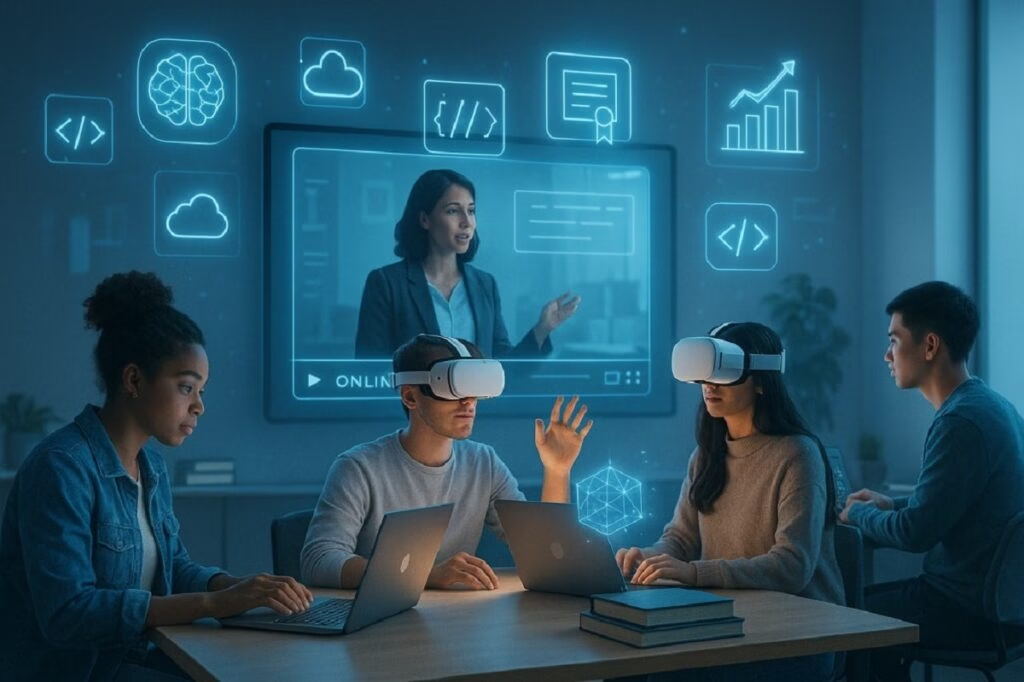Introduction: The Changing Face and Importance of Education
In today’s fast-paced, ever-evolving world, education is no longer confined to the four walls of a classroom. Traditional methods of teaching and learning are being rapidly transformed by technology, globalization, and shifting industry demands. Modern education is about preparing individuals for real-world challenges—not just academically, but professionally, emotionally, and socially.
The 21st-century learner requires a new set of skills to thrive: digital literacy, critical thinking, adaptability, and continuous learning. In this article, we’ll explore how modern education is adapting to these needs, and what skills are essential to succeed in the future.
Online Learning Platforms
One of the most significant shifts in education is the rise of online learning. Thanks to platforms like Coursera, edX, Khan Academy, Udemy, and LinkedIn Learning, students from around the world can access high-quality education regardless of location or financial background.
Benefits of Online Learning:
-
Flexibility: Learn at your own pace, anytime, anywhere.
-
Accessibility: Anyone with an internet connection can participate.
-
Affordability: Many courses are free or cost significantly less than traditional education.
-
Diversity of Topics: From coding and design to business and psychology, there’s a course for almost every subject.
Online degrees are also gaining legitimacy. Prestigious universities now offer fully accredited programs online, allowing working professionals and remote learners to advance their careers.
Skill Development & Certifications
As industries continue to evolve, there’s a growing need for professionals with specialized skills. Certifications and micro-credentials are becoming valuable alternatives to traditional degrees.
In-Demand Skills for the Future:
-
Data Analysis & Machine Learning
-
Cloud Computing & Cybersecurity
-
UI/UX Design & Digital Marketing
-
Project Management & Agile Methodologies
-
Foreign Languages & Communication Skills
Many online platforms offer industry-recognized certifications. For instance:
-
Google Career Certificates
-
Meta Marketing Certifications
-
AWS Certified Cloud Practitioner
-
HubSpot Content Marketing Certification
These credentials can significantly boost a resume and open doors to job opportunities, even without a university degree.
Career Guidance & Job Market Trends
Modern education is aligning more closely with market needs. Today’s educators and institutions are focusing on employability rather than just theoretical knowledge.
Key Career Trends:
-
Remote Work & Freelancing: Skills like communication, self-management, and digital proficiency are vital.
-
Gig Economy: Many professionals now work independently across platforms like Fiverr, Upwork, and Freelancer.
-
Tech-Centric Roles: Artificial intelligence, software development, and data science are booming.
-
Green Jobs: With a growing focus on sustainability, careers in environmental science and green energy are on the rise.
Educational institutions are now including career counseling, internships, and industry partnerships to ensure students are job-ready upon graduation.
Study Tips & Productivity Hacks
With education becoming more self-directed, students must adopt smart study strategies to stay on track and succeed.
Top Study Tips:
-
Set SMART Goals – Specific, Measurable, Achievable, Relevant, Time-bound.
-
Use the Pomodoro Technique – 25 minutes of focused study followed by a 5-minute break.
-
Leverage Digital Tools – Apps like Notion, Trello, Anki, and Grammarly enhance learning.
-
Active Recall & Spaced Repetition – These memory techniques help retain information long-term.
-
Create a Study Schedule – Consistency matters more than long hours.
Success in modern education depends on being proactive and taking control of your learning journey.

Importance of Soft Skills
While technical skills are crucial, soft skills are equally—if not more—important in today’s collaborative work environments.
Essential Soft Skills:
-
Communication: Verbal and written clarity boosts professional performance.
-
Teamwork: Working well in teams is a major asset in all industries.
-
Emotional Intelligence: Understanding emotions helps in leadership and conflict resolution.
-
Adaptability: The ability to learn and evolve with change.
-
Problem-Solving: Employers value those who can think critically and offer solutions.
Many modern curriculums now include soft skills training through group projects, presentations, and role-playing activities.
Education Technology Tools
Technology is the backbone of modern education. From AI tutors to virtual classrooms, edtech is reshaping how we teach and learn.
Popular EdTech Tools & Innovations:
-
Learning Management Systems (LMS): Moodle, Canvas, and Google Classroom help manage coursework online.
-
AI-Based Tutoring: Tools like ScribeSense and ChatGPT assist students in writing, research, and learning.
-
Gamified Learning: Duolingo, Kahoot!, and Quizlet make studying fun and engaging.
-
Virtual Reality (VR) & Augmented Reality (AR): These tools create immersive learning environments, especially in science, medicine, and engineering.
-
Collaborative Platforms: Google Workspace and Microsoft Teams allow seamless group work and communication.
The integration of technology helps personalize learning, increase engagement, and make education more efficient.
Conclusion & Encouragement for Lifelong Learning
The world is changing at an unprecedented pace, and so is the way we learn. Modern education is more flexible, accessible, and personalized than ever before. But success doesn’t come from just attending classes or earning degrees—it comes from the commitment to continuous learning.
Whether you’re a student, a working professional, or someone exploring a career change, embracing modern education trends can open up a world of opportunities. Learn new skills, adapt to changes, build strong networks, and keep growing.
Because in the age of rapid transformation, the most valuable skill is the ability to keep learning.